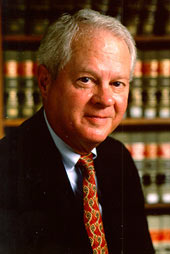Pedagogy: The Law School’s Constant Hallmark
Earl C. Dudley, Jr. ‘67
 Earl Dudley, Jr. '67
Earl Dudley, Jr. '67 |
I DISTINCTLY RECALL being apprehensive about the intellectual prospect of law school when I arrived in Charlottesville in the fall of 1964. I particularly resented being required to take a course in property law, which I viewed as a dusty corner important only to those drudges, the future real estate conveyancers.
Imagine my delight when, two weeks into the first semester, I discovered I was more engaged than ever before. And imagine my surprise when I realized that property, as taught by Tom Bergin, was one of the best courses I ever had. Tom’s relentless questioning, his deft exposition of the kaleidoscopic quality of legal concepts, opened my eyes to the world of legal analysis. He would toss out a puckish question—“Did Pierson win because he had possession of the fox, or did he have possession of the fox because he won?”—and weave around it an entire class of playful but serious inquiry.
I was fortunate my first year to study under several of the other giants of the Law School’s teaching pantheon— Hardy Dillard, Peter Low, John McCoid. Each had a different and unique style, but all were born teachers. Dean Dillard brought to the classroom his trademark polished eloquence, a powerful combination of formal Socratic method with entertaining lectures, and an uncanny ability to make complex concepts clear and understandable. Peter Low treated each class with the care and intense preparation of an appellate argument, moving the students along the path to his conclusion while leading them to believe all along it was their own. John McCoid walked a wonderful tightrope between gentle decency and bracing intellectual challenge. He was not called “The Cobra” for nothing.
These wonderful teachers and many others were part of an already long-established tradition of classroom excellence at the Law School, a tradition that has continued undiminished to the present day. Our students are now treated regularly to the lively updated Socratism of Jody Kraus; the gentle, off-beat wit and wisdom of George Rutherglen; the rapid-fire lectures of Caleb Nelson (one colleague likens learning from a Nelson lecture to trying to get a drink from a fire hose); the focused precision and elegance of Ann Woolhandler; the encyclopedic knowledge and insatiable curiosity of a polymath like John Harrison; the mordant critiques of Stephen Smith; and the erudite and transformative learning of Mike Klarman.
One of the great joys of my career (I joined the faculty in 1989, after more than two decades in law practice) has been to observe over the last 17 years the careful nurturing of this pedagogical tradition, the preservation by example of the commitment to excellent teaching. In a day when legal scholarship is the dominant mode of professional advancement for young faculty, the powerful continuity of this tradition is a testament to the unique ethos of this place.
A number of my own teachers were still active when I came back, and I have tried to learn from them and from those who came after 1967 how to stimulate and encourage the intellectual drive that has made my career in the law such a lifelong pleasure.
Teaching, I have concluded after many years on both sides of the podium, is a two-way street. What makes teaching Virginia Law students such a joy—and in some respects so easy—is their consistently high quality, their intellectual capacity, their incredibly rich and diverse backgrounds, their eagerness to learn, their willingness to question, but above all their wonderful quality as human beings. Standing in front of a group of such students, it is not hard to initiate and sustain a dialogue that is searching, purposeful, focused, but also civil, sometimes amusing, and entirely pleasurable.
My own effort has been to convey to my students simultaneously the intellectual rigor of legal analysis and the indeterminacy of legal outcomes. (Hardy Dillard said lawyers must teach others to “learn to live with ambiguity.”) I try to ask questions—in class and on exams—that have no obvious “right” answers and to encourage students to frame their own answers in light of the intellectual framework provided by statutes and judicial decisions. I am sure that I, like all teachers, succeed better in this enterprise on some days than on others. But my entire “second career” has been inspired by the knowledge that I work within a hallowed tradition of teaching excellence and by my constant effort to be worthy of my teachers and colleagues in perpetuating that tradition.
Earl C. Dudley Jr. ’67 is a professor at the Law School, as well as director of the school’s Graduate Program for Judges. Beginning in 1982, Dudley taught trial advocacy seminars at the Law School while he was a partner in the Washington, D.C. law firm of Nussbaum Owen & Webster. Then, in 1989, he became a full-time faculty member. Dudley’s career, before he came to Virginia, was in private practice, except for two years when he was general counsel for the Committee on the Judiciary in the U.S. House of Representatives. At the Law School, Dudley teaches civil and criminal procedure, evidence, criminal law, constitutional law, and trial advocacy.




